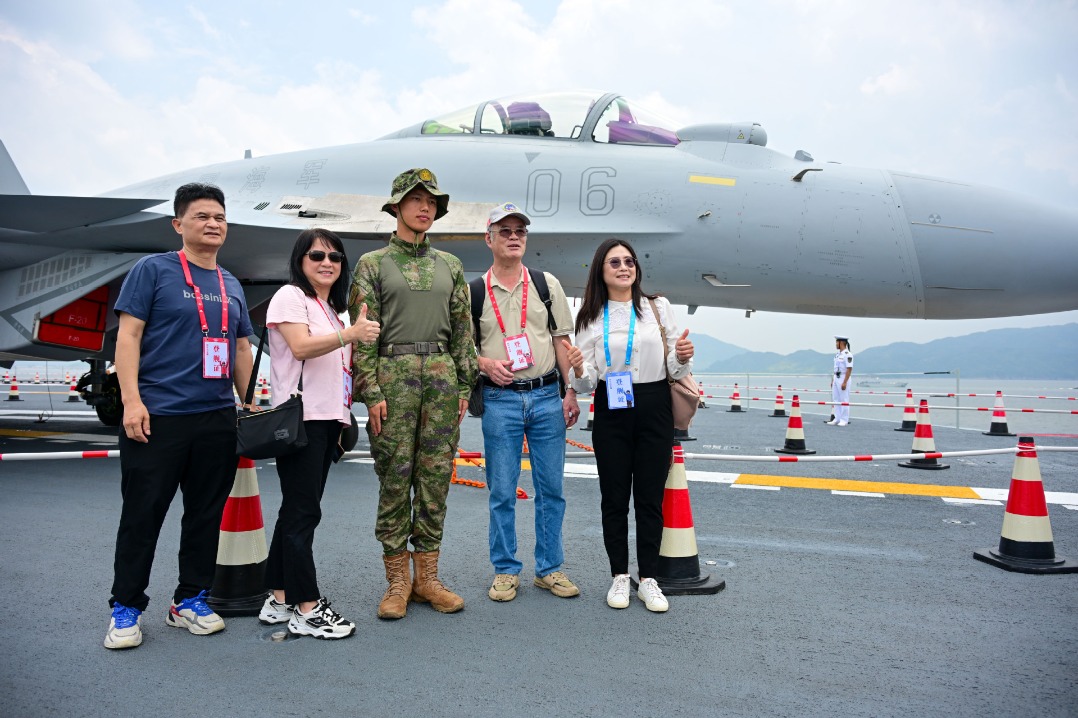Trade frameworks linking China, Africa set to broaden
Business volume between two sides surged to historic peak of $282.1 billion last year, an increase of nearly 35 percent compared to 2013


Cross-border e-commerce represents a significant opportunity for China to deepen its economic ties with Africa. By bringing their proven e-commerce models to African consumers, Chinese platforms can open up new channels for trade and investment, Wang added.
Chinese enterprises have already established a strong presence across Africa, but there is tremendous untapped potential to grow these relationships further, Wang said.
The Chinese government has announced plans to facilitate at least 70 billion yuan ($9.9 billion) in investments by Chinese companies in Africa over the next three years. Meanwhile, China and Africa will establish a joint digital technology cooperation center and announce plans for 20 flagship digital demonstration projects.
Lei Jun, founder and chairman of Chinese smartphone maker Xiaomi, said that Africa's economic dynamism and policy focus on sustainable development make it a compelling investment destination for Xiaomi.
Africa continues to outpace global economic growth, buoyed by the launch of the African Continental Free Trade Area, which has driven greater cross-border trade and market integration, Lei said.
"We see tremendous potential to partner with African businesses in emerging sectors like new energy vehicles and other green technologies," Lei said, adding that building on its presence in 16 African countries, including Egypt, Nigeria and Kenya, Xiaomi is gearing up to increase its investments across the continent.
That said, without closely interconnected infrastructure, discussions about unimpeded trade, financial integration and people-to-people exchange would be impossible, experts said.
Infrastructure is the cornerstone of Africa's development. Improving infrastructure conditions is a common expectation and urgent desire of African countries, said Xu Hongcai, deputy director of the China Association of Policy Science's Economic Policy Committee.
However, the African Development Bank estimated that infrastructure development requires between $130 billion and $170 billion annually, with a funding gap of $68 billion to $108 billion.
While infrastructure investment has faced headwinds in certain regions, China's infrastructure push in Africa has persisted, to deliver much-needed transportation, energy, and telecommunications projects, Xu said.
Over the past decade, Chinese firms have constructed or refurbished an expansive network of critical transport, energy, and communications systems that are helping to integrate Africa's economies and facilitate greater regional connectivity, from a major new port facility in Djibouti to a transnational railway network linking Kenya, Uganda and South Sudan.
The numbers speak for themselves — Chinese companies have built or upgraded over 10,000 kilometers of railways, nearly 100,000 kilometers of roads, around 1,000 bridges, close to 100 ports, 66,000 kilometers of power transmission lines, and 150,000 kilometers of backbone communication networks, according to the National Development and Reform Commission.
Chinese firms have played an outsized role in bridging Africa's massive infrastructure gaps. This has been a game-changer, paving the way for accelerated economic growth, boosted local job creation, and integration across the continent, Xu said.
Going forward, China will implement 30 major infrastructure connectivity projects across the African continent, in a move aimed at deepening China-Africa cooperation under the Belt and Road Initiative and supporting the development of the African Continental Free Trade Area.
However, a narrative has been propagated by some Western media outlets, attempting to sensationalize China's engagement in Africa through BRI projects by labeling it as a form of "debt trap diplomacy".
The strategic partnerships forged through infrastructure projects, trade agreements, and diplomatic engagements have not only bolstered Africa's path toward sustainable development, but also strengthened bonds of friendship and mutual benefit between China and Africa, Ye, who is with the China-Africa Institute, said.
Amid these advancements, a shift in dynamics is becoming increasingly evident, with Western influence in Africa encountering economic setbacks similar to those experienced in other regions, Ye said, adding that African nations are no longer willing to be coerced by Western powers.
As Western powers witness a waning of their influence in Africa, they are grappling with a need to deflect attention from their own shortcomings and find a scapegoat to mask their ineffectiveness, Ye said.
Looking ahead, China and Africa will deepen the alignment between the BRI and the African Union's Agenda 2063, to empower African nations not just by "providing fish, but by imparting the art of fishing", Ye said.
Central to this collaboration is the goal of facilitating Africa's industrialization and fostering localized production of industrial goods, aiming to address the historic imbalance in industrial and agricultural development that has persisted since the colonial era and prevent African countries from being mere markets for Western industrial products, experts said.
Chinese industrial products have strong competitiveness in Africa, helping improve the livelihoods of many people in African countries, boosting economic development, and catalyzing the pace of their local industrialization, Ye said.
However, this is not enough. Therefore, it's important to further encourage the localized realization of industrialization in Africa. This means manufacturing products in Africa are tailored for the African market, so that industrialization in Africa can directly benefit the African people. China has sufficient experience, technology, and funding to assist Africa in achieving this goal, Ye said.
As the world grapples with a multitude of global challenges, from climate change to the lingering impacts of the COVID-19 pandemic, China-Africa cooperation has demonstrated the potential for developing countries to work together, leverage their complementarities, and foster innovative solutions that prioritize their common interests and development aspirations, Ye added.
wangkeju@chinadaily.com.cn
























